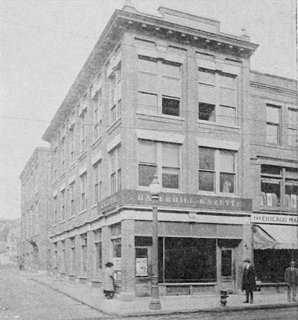Related Research Articles

Thomas Hughes was an English lawyer, judge, politician and author. He is most famous for his novel Tom Brown's School Days (1857), a semi-autobiographical work set at Rugby School, which Hughes had attended. It had a lesser-known sequel, Tom Brown at Oxford (1861).
Edward Hayes Plumptre was an English divine and scholar born in London.

All the Year Round was a Victorian periodical, being a British weekly literary magazine founded and owned by Charles Dickens, published between 1859 and 1895 throughout the United Kingdom. Edited by Dickens, it was the direct successor to his previous publication Household Words, abandoned due to differences with his former publisher.

William Hepworth Dixon was an English historian and traveller. He was also active in organizing London's Great Exhibition of 1851.

The Daily Herald was a British daily newspaper, published in London from 1912 to 1964. It was published in the interest of the labour movement and supported the Labour Party. It underwent several changes of management before ceasing publication in 1964, when it was relaunched as The Sun, in its pre-Murdoch form.

John Clark Marshman (1794–1877) was an English journalist and historian. He was editor and publisher of the Calcutta-based Friend of India and was involved with several other Indian publications.

Edward James Stephen Dicey, CB was an English writer, journalist, and editor.
Henry Dunckley was an English Baptist minister, journalist and newspaper editor.

Henry Whitney Bellows was an American clergyman, and the planner and president of the United States Sanitary Commission, the leading soldiers' aid society, during the American Civil War. Under his leadership, the USSC became the largest and most effective organization dedicated to supporting the health and efficiency of the Union army.
George Earle Buckle was an English editor and biographer.
George Benjamin Hunter may refer to:
Edward (Ed) Finn, Jr. is a Canadian trade unionist and journalist, editor, author and former Newfoundland politician. He was the leader of the Newfoundland Democratic Party and the first leader of the Newfoundland New Democratic Party.
John Howard Nodal (1831–1909) was an English journalist, linguistic and writer on dialect.

Lloyd Jones, born Patrick Lloyd Jones, was an Irish socialist and union activist, advocate of co-operation, journalist and writer.

The Haverhill Gazette (est.1821) is a weekly newspaper in Massachusetts, owned by Community Newspaper Holdings Inc. of Montgomery, Alabama. For at least part of its history, it was a daily. In 1998 the paper was bought by the Eagle Tribune Company and converted to a weekly. In 2005 it was bought by Community Newspaper Holdings.
Archibald Prentice (1792–1857) was a Scottish journalist, known as a radical reformer and temperance campaigner.
Manchester City News was a weekly local newspaper founded in Manchester, England. Published every Saturday, the first edition went on sale on 2 January 1864, priced at one penny. The newspaper was circulated not only in Manchester and neighbouring Salford but also more widely throughout the towns of Lancashire and Cheshire. It focused largely on commercial and local issues such as meetings of the town council and proceedings in the law courts, but it also included some more general news and book reviews.
The Richmond Examiner, a newspaper which was published during the American Civil War under the masthead of Daily Richmond Examiner, was one of the newspapers published in the Confederate capital of Richmond. Its editors viewed strong executive leadership as a threat to the liberties of its subscription readership. The paper published staunch and increasingly vitriolic opposition to the leadership and policies of Confederate President Jefferson Davis. Historians often consult the pages of the Examiner for insights into the growing problems faced by the Davis administration and the South as they faced the increasing prospect of defeat in the Civil War.
Charles Rogers (1825–1890) was a Scottish minister, and a versatile, prolific author. In the second half of his life he repeatedly ran into trouble for setting up publication societies from which he gained financial benefit.
References
